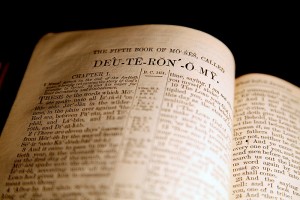Deuteronomy 4:6, Keep. Keeping Torah (YHVH’s instructions in righteousness) was the means for YHVH’s chosen people to be salt and light to the surrounding nations. Torah is literally a “witnessing tool.” What kind of righteous witness are you (via your Torah lifestyle) to those around you who are lost in spiritual darkness?

YHVH’s Torah will help guide you in the spiritual darkness of this world, and it will make you a light to others in that darkness as well.
Wisdom [Heb. chokmah] and understanding [Heb. biynah]. Chokmah means “intelligence, skill (in war); wisdom (in administration); shrewdness, wisdom; prudence (in religious affairs); wisdom (ethical and religious). It derives from the verb chakam meaning “to be wise; to be or become wise, act wisely; to make wise, teach wisdom, instruct; to show oneself wise, deceive, show one’s wisdom.” According to the TWOT, chokmah and it’s root verb represents a manner of thinking and attitude concerning life’s experiences including matters of general interest and basic morality. These concerns relate to prudence in secular affairs, skills in the arts, moral sensitivity, and experience in the ways of YHVH. In the Tanakh, chokmah is used in relationship to the whole gamut of human experience whether it be technical artisan skills, military tactics, political and administrative leadership. It is expressed in shrewdness as opposed to foolishness or silliness. Prudence is another aspect of chokmah as it relates to how one speaks, uses his time carefully and in the practical affairs of life. The Bible reveals that Elohim is the source of all wisdom, and wisdom is not to be found in human speculation. Elohim alone provides wisdom for man’s guidance, so that he can live the best possible moral and ethical life (Ibid.).
Biynah means “discernment or insight” or “the ability to understand something, comprehension, the power of abstract thought, an individual’s perception or judgment of a situation.” According to the TWOT, binyah refers to knowledge that is superior to the mere gathering of data. It is necessary to know how to use the knowledge one possesses. This is where perception or judgment comes into play. One must properly interpret the data and make wise and discerning decisions as to how to act.
Torah is your wisdom in the sight of the nations. Consider the following:
- Your life may be the only Bible some people read.
- Torah is light. Light quietly does, it is silent. It doesn’t talk about doing, it does! YHVH is looking for doers, not talkers.
- What kind of reputation do you have in the community?
- People may not be turning to the light of Torah as a result of your example YET, but when times get tough in this country (“when you are in tribulation … in the latter days, Deut 4:30), they may well turn to you for the answers because they remembered that there was something different about you—something pure, pristine and holy. That’s when they’ll be looking for answers.
- Torah makes us a great people. YHVH measures greatness differently than the world does. Are you great by the world’s standards or YHVH’s standards?
- How does YHVH measure greatness? Love, faith, truth, obedience, servanthood, giving, selflessness, self-sacrifice.
- Comparatively speaking, how does the world measure greatness? Money, power, fame, possessions, intellect, physical appearance, good sounding words.
- Which type of greatness will last into eternity?
Never forget this: Yeshua the Messiah is the spiritual light of the world that came from heaven to guide men through the spiritual darkness of this world and lead them to his Father in heaven. He is not only the Light, but the Word of Elohim made flesh. In other words, he is the Living Torah Word of Elohim. He was the exemplification and personification of the Written Torah. Only through him living in us through is Set-Apart Spirit can we properly obey YHVH’s Torah commandments. This we will do by his power in us and out of a loving relationship with him. The Testimony of Yeshua makes these truths very clear for those who have eyes to see and hearts to comprehend!




